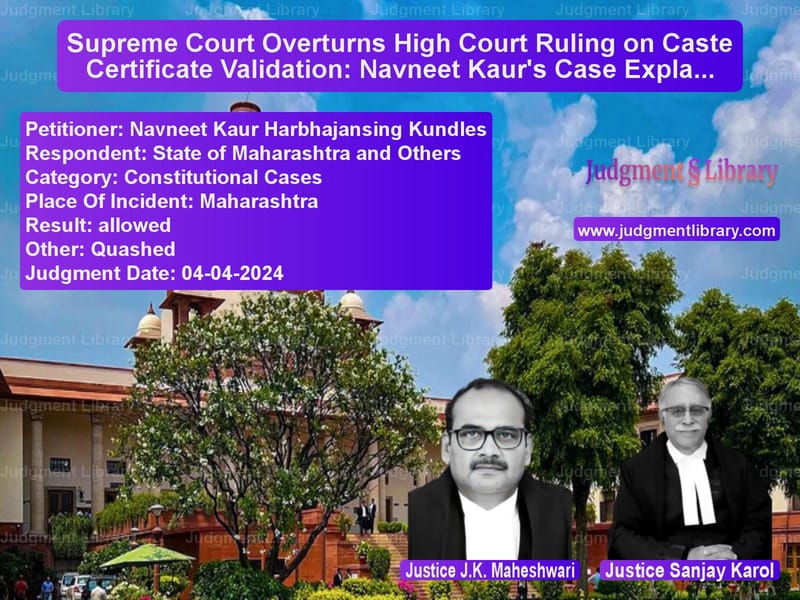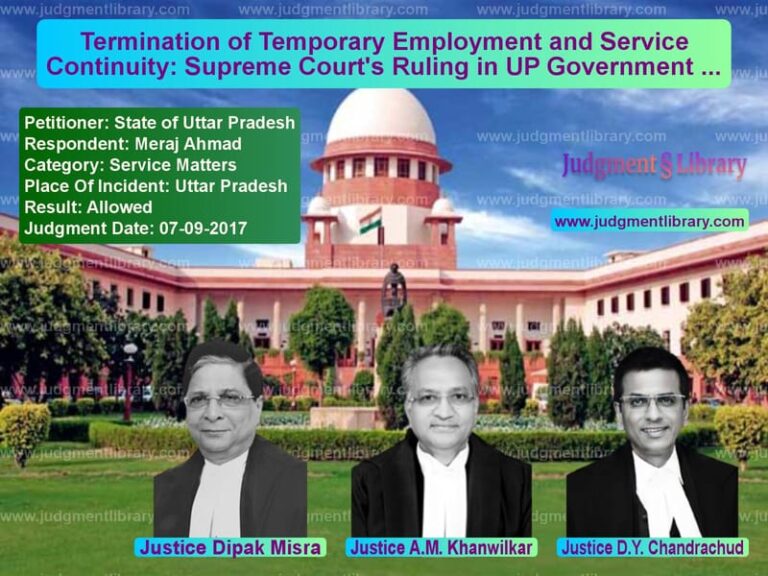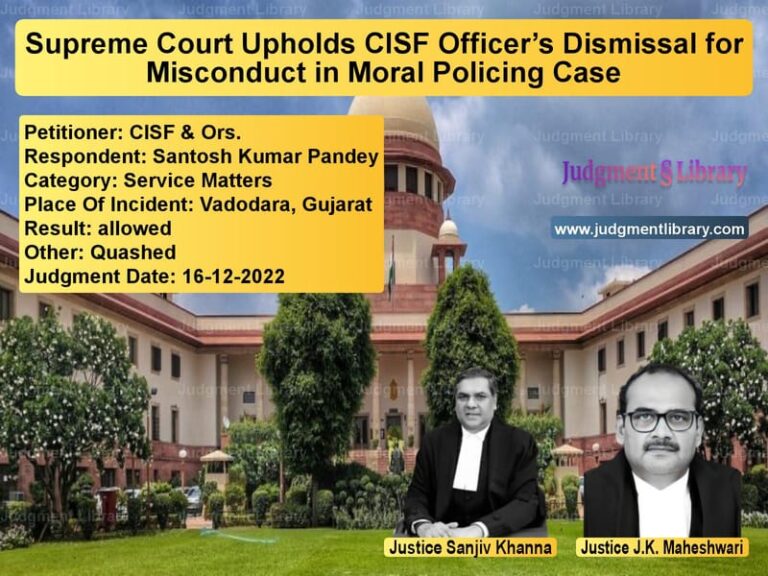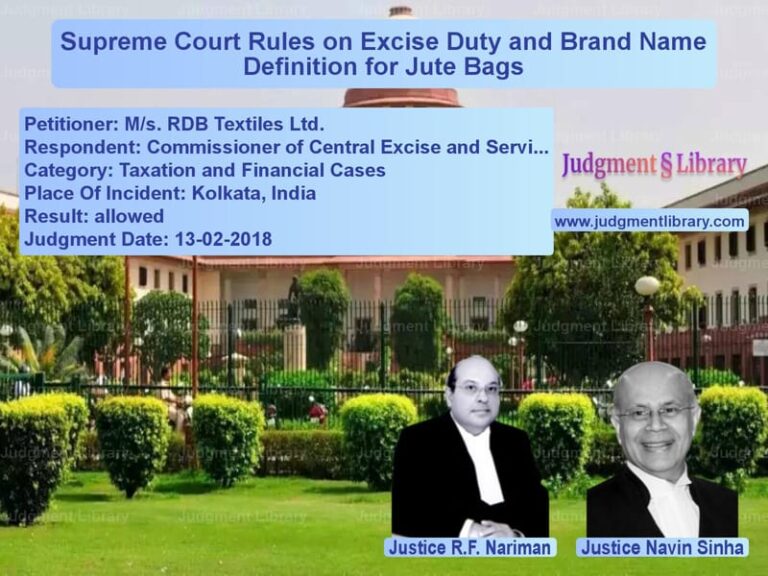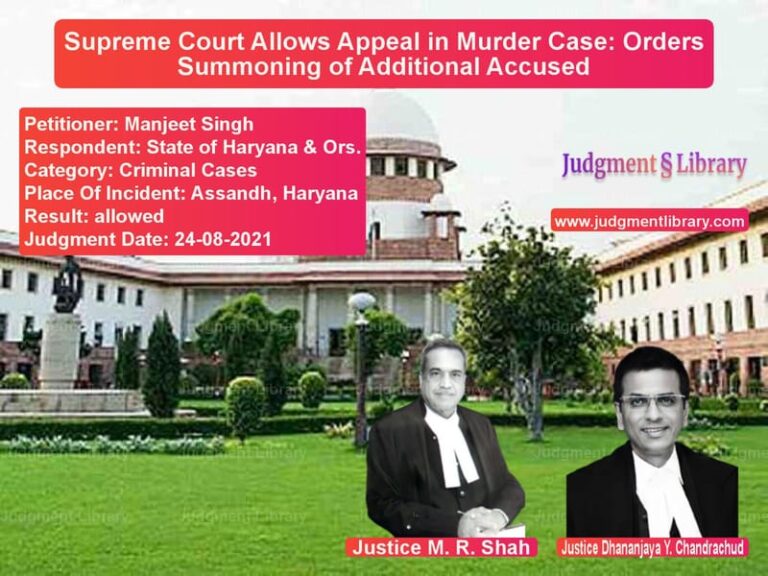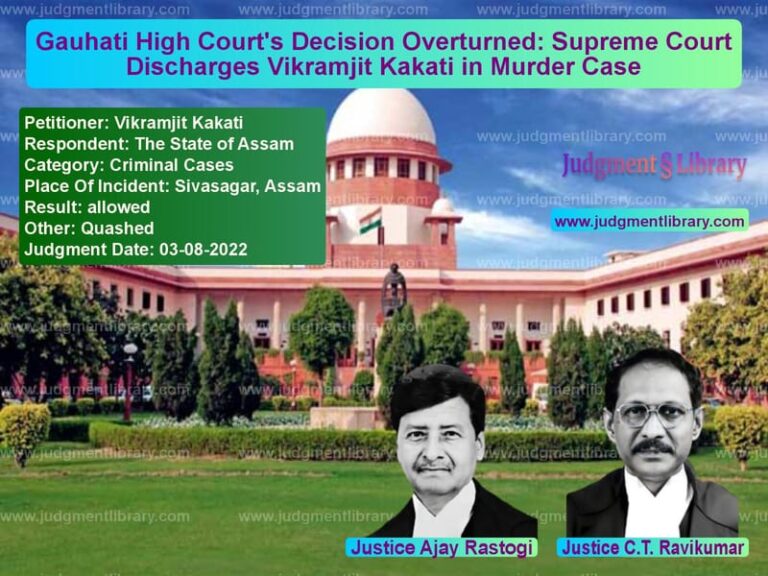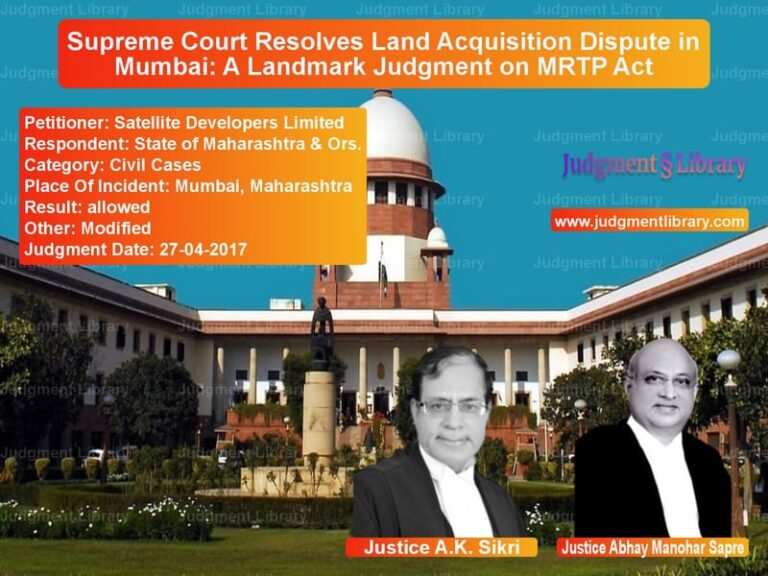Supreme Court Overturns High Court Ruling on Caste Certificate Validation: Navneet Kaur’s Case Explained
The case of Navneet Kaur Harbhajansing Kundles vs. State of Maharashtra & Others is a landmark judgment that deals with the validation of caste certificates, the scope of judicial interference, and the application of the Presidential Order of 1950. The Supreme Court had to decide whether the High Court was justified in overturning the findings of the Scrutiny Committee, which had validated the appellant’s caste claim.
Background of the Case
Navneet Kaur, the appellant, had contested the 2019 parliamentary elections from the Amravati constituency in Maharashtra on a seat reserved for Scheduled Castes. Her victory was challenged on the grounds that she had obtained her caste certificate fraudulently. The dispute had its origins in 2013 when complaints were lodged before the Scrutiny Committee alleging that the appellant had procured her ‘Mochi – Scheduled Caste’ certificate based on forged documents. The Scrutiny Committee, after considering the evidence, validated her caste certificate on 03.11.2017.
Read also: https://judgmentlibrary.com/supreme-court-directs-immediate-disclosure-of-electoral-bond-details/
Aggrieved by this decision, respondents, including political opponents, filed writ petitions before the Bombay High Court, challenging the validity of the caste certificate. The High Court quashed the Scrutiny Committee’s order, imposed a penalty of Rs. 2,00,000 on the appellant, and directed her to surrender her caste certificate. The appellant, in turn, appealed to the Supreme Court.
Arguments by the Petitioner (Navneet Kaur)
- Her counsel argued that the High Court exceeded its jurisdiction under Article 226 of the Constitution by interfering with the factual findings of the Scrutiny Committee.
- It was contended that the Scrutiny Committee, being a quasi-judicial authority, had conducted a thorough fact-finding exercise and validated the caste claim after proper verification.
- The appellant relied on the Indian Evidence Act, arguing that documents related to her forefathers carried a statutory presumption of validity.
- She further contended that the High Court wrongly discarded the two primary documents relied upon by the Scrutiny Committee—the bona fide certificate of her grandfather and the Indenture of Tenancy of 1932, which proved her family’s migration to Maharashtra from Punjab.
Arguments by the Respondents (State of Maharashtra and Others)
- The respondents, represented by senior counsel, argued that the caste certificate was fraudulently obtained using forged and fabricated documents.
- They contended that the appellant’s claim was inconsistent as she initially claimed to be ‘Ravidasia Mochi’ from Punjab and later produced documents to claim ‘Sikh Chamar’ status.
- The respondents argued that the caste ‘Mochi’ in Maharashtra did not include ‘Sikh Chamar’ or ‘Ravidasia Mochi,’ as per the Presidential Order of 1950.
- They emphasized that the High Court was justified in interfering with the Scrutiny Committee’s order, as the findings were based on inadmissible evidence.
Supreme Court’s Analysis and Judgment
The Supreme Court held that the High Court had overstepped its jurisdiction by re-evaluating the factual findings of the Scrutiny Committee. The Court observed:
- The Scrutiny Committee had followed the due process under the Maharashtra Scheduled Castes, Scheduled Tribes, De-Notified Tribes, Nomadic Tribes, Other Backward Classes, and Special Backward Category (Regulation of Issuance and Verification of) Caste Certificate Act, 2000.
- The Vigilance Cell had verified the appellant’s documents, and the Scrutiny Committee had conducted a proper inquiry before validating the caste claim.
- The Presidential Order must be read as it is, and no further interpretation is permissible. However, in this case, the appellant had claimed ‘Mochi’ caste, which is listed in the Presidential Order for Maharashtra.
- The High Court’s reliance on minor discrepancies in handwriting and ink used in the documents was unwarranted, as such factual assessments fell within the domain of the Scrutiny Committee.
- The High Court’s refusal to accept the findings of the Scrutiny Committee amounted to acting as an appellate authority, which was impermissible under Article 226.
On these grounds, the Supreme Court set aside the High Court’s ruling and restored the Scrutiny Committee’s validation of the appellant’s caste certificate.
Conclusion
This judgment reinforces the principle that courts should not interfere in factual determinations made by specialized tribunals unless there is clear evidence of jurisdictional error, bias, or violation of natural justice. The Supreme Court’s ruling ensures that caste validation procedures remain within the domain of designated authorities, preventing unnecessary judicial overreach.
Read also: https://judgmentlibrary.com/supreme-court-orders-immediate-disclosure-of-electoral-bond-details/
Petitioner Name: Navneet Kaur Harbhajansing Kundles.Respondent Name: State of Maharashtra and Others.Judgment By: Justice J.K. Maheshwari, Justice Sanjay Karol.Place Of Incident: Maharashtra.Judgment Date: 04-04-2024.
Don’t miss out on the full details! Download the complete judgment in PDF format below and gain valuable insights instantly!
Download Judgment: navneet-kaur-harbhaj-vs-state-of-maharashtra-supreme-court-of-india-judgment-dated-04-04-2024.pdf
Directly Download Judgment: Directly download this Judgment
See all petitions in Fundamental Rights
See all petitions in Public Interest Litigation
See all petitions in Constitution Interpretation
See all petitions in Judgment by J.K. Maheshwari
See all petitions in Judgment by Sanjay Karol
See all petitions in allowed
See all petitions in Quashed
See all petitions in supreme court of India judgments April 2024
See all petitions in 2024 judgments
See all posts in Constitutional Cases Category
See all allowed petitions in Constitutional Cases Category
See all Dismissed petitions in Constitutional Cases Category
See all partially allowed petitions in Constitutional Cases Category

